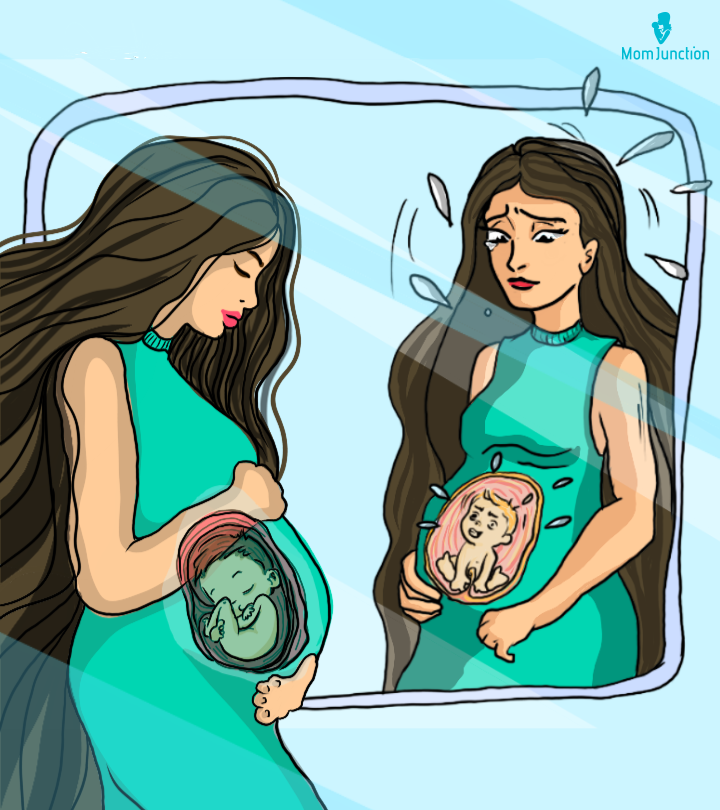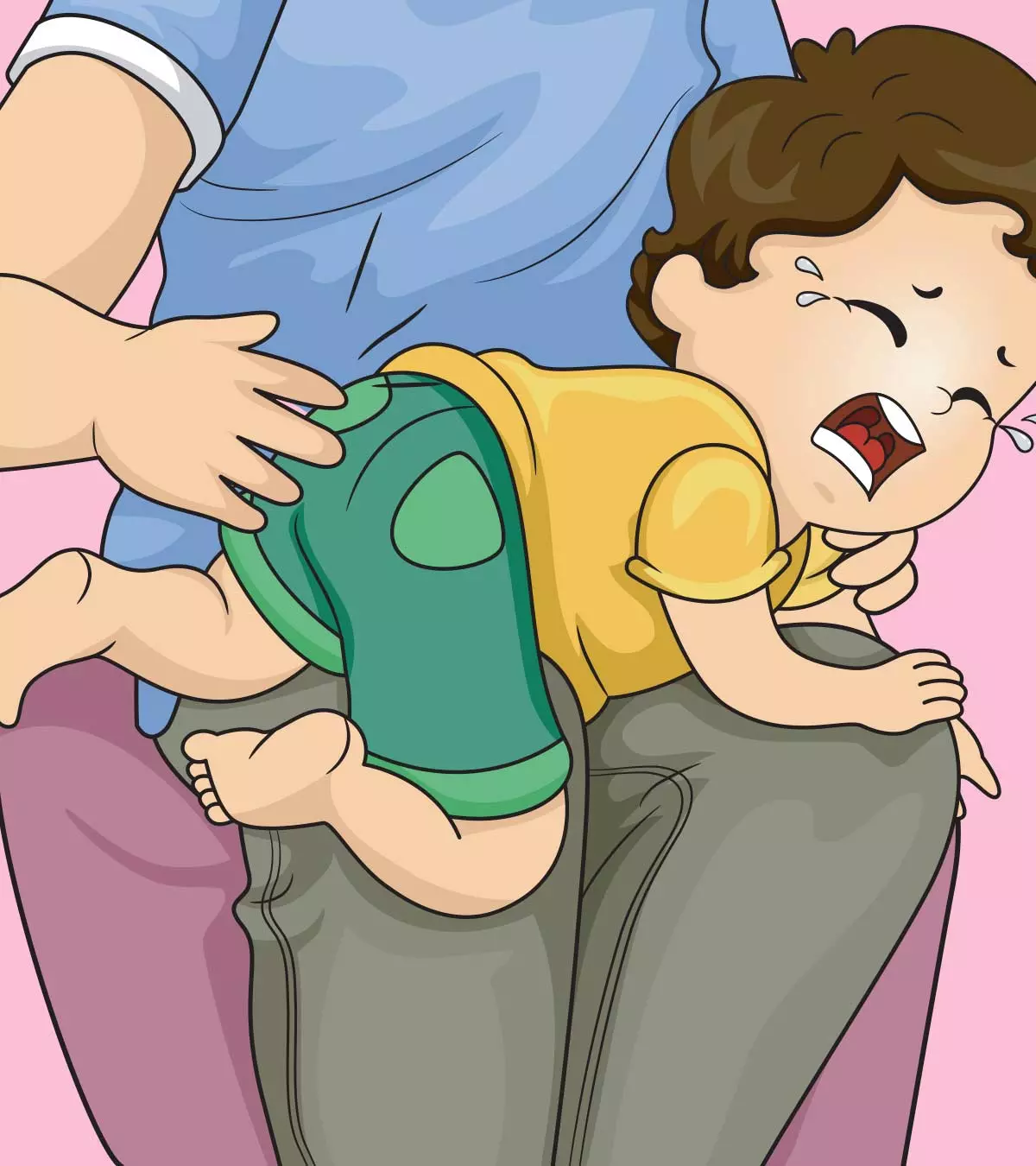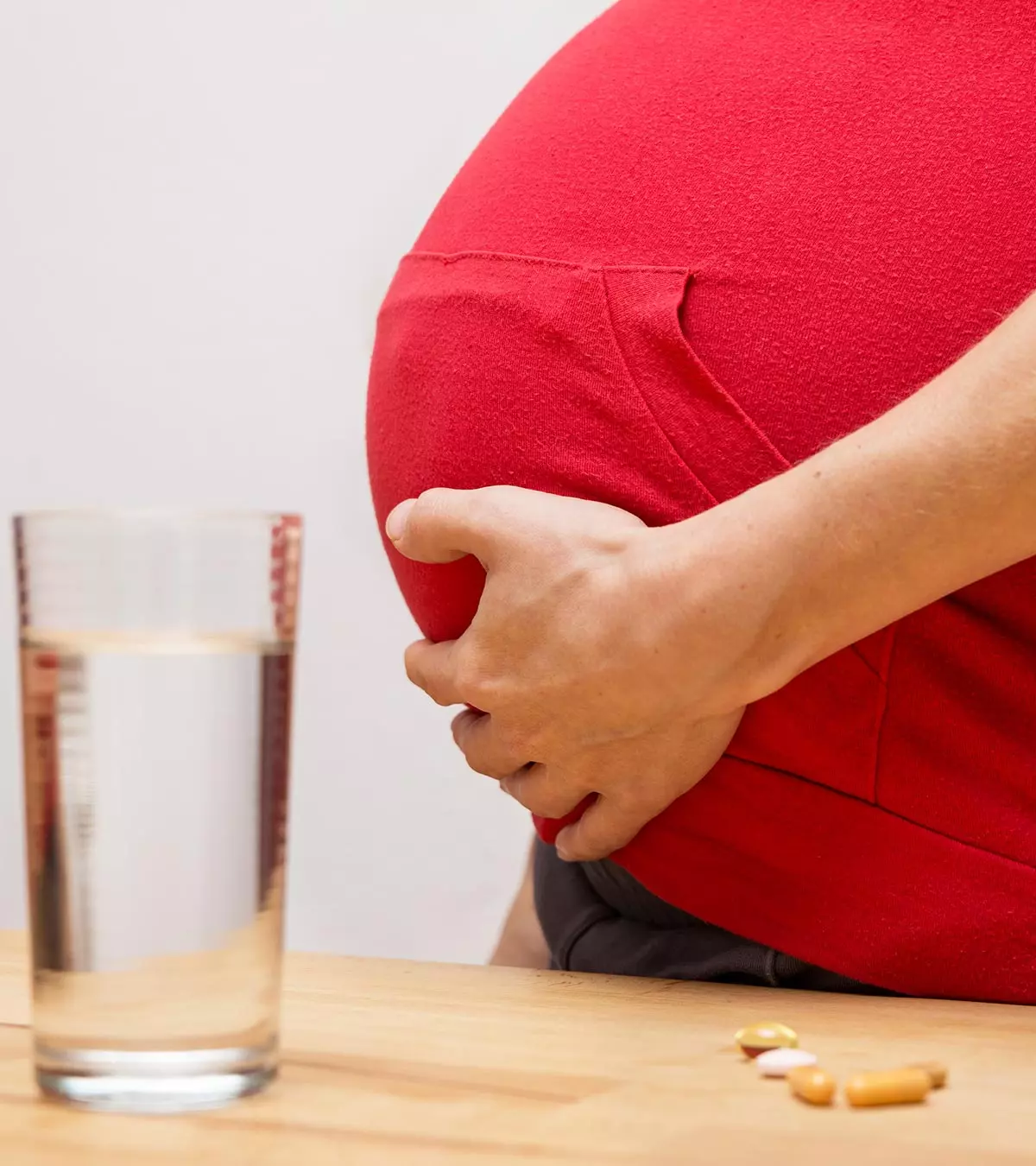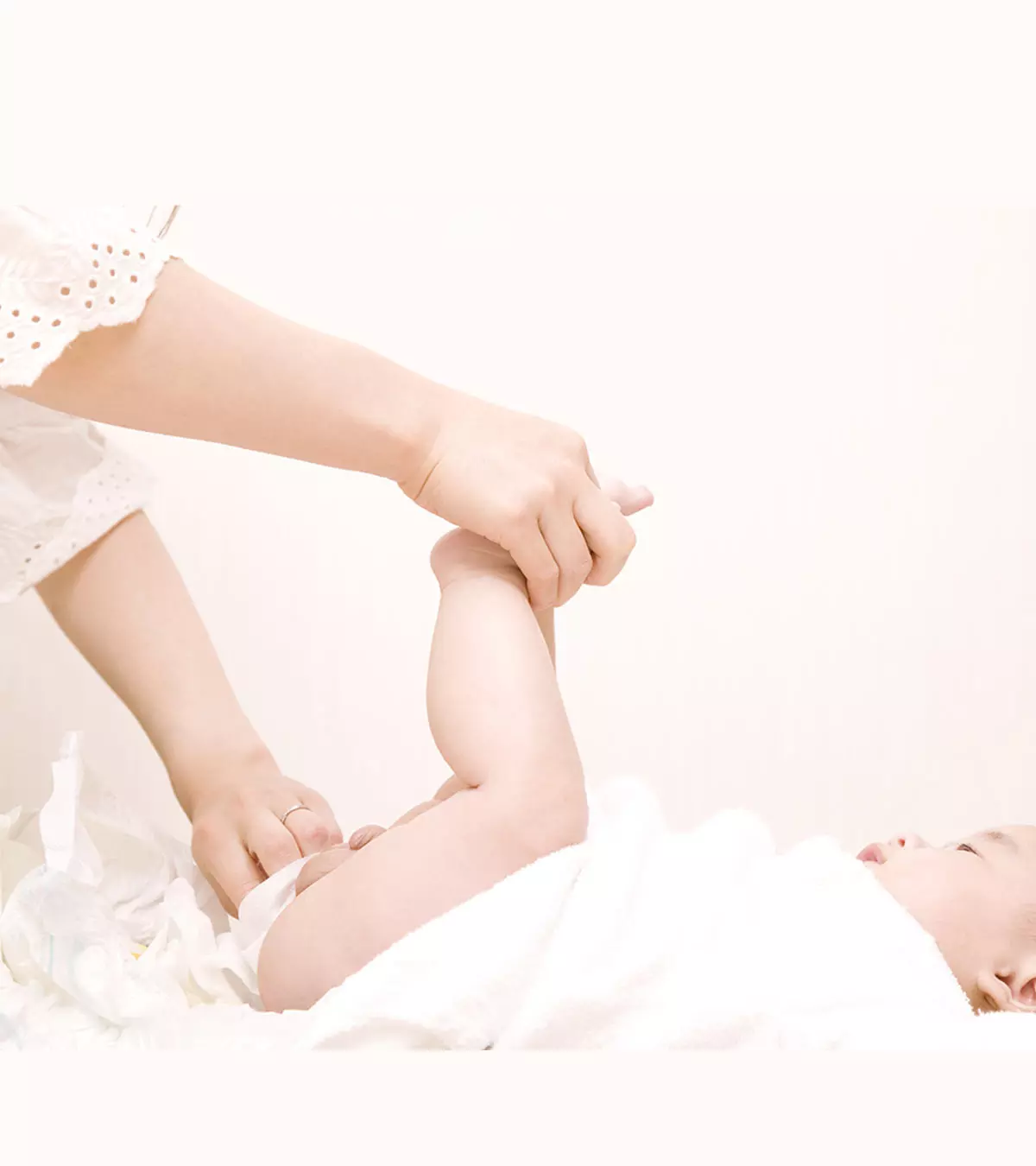
Image: Shutterstock

If you are an expecting mother, you would know that long hours standing during pregnancy becomes difficult with the increase in the baby’s size. Therefore, you are often suggested walking or changing positions at regular intervals. However, if your occupation requires you to stand for a long time, you should take small steps regularly because prolonged standing can give you back pain and adversely affect your baby’s growth. You should also take some important safety measures to lower the impact of standing so you do not have to deal with its side effects. Keep reading to know more about the safety of standing for a long duration during pregnancy, how it affects your health, and what you can do to overcome it.
Key Pointers
- Standing for extended periods can lower the mother’s blood pressure and reduce oxygen flow to the baby, potentially affecting fetal development.
- Extended standing hours may cause pain in the lower back, legs, and pubic area, as well as edema and an increased risk of preterm labor.
- To reduce discomfort, wearing supportive footwear, maternity belts, or compression stockings, staying hydrated, propping up a foot, and taking short walks are recommended.
- To reduce swelling and stress levels, breathing exercises, meditation, and sleeping on the left side can be helpful.
Is It Safe To Stand Too Long During Pregnancy?
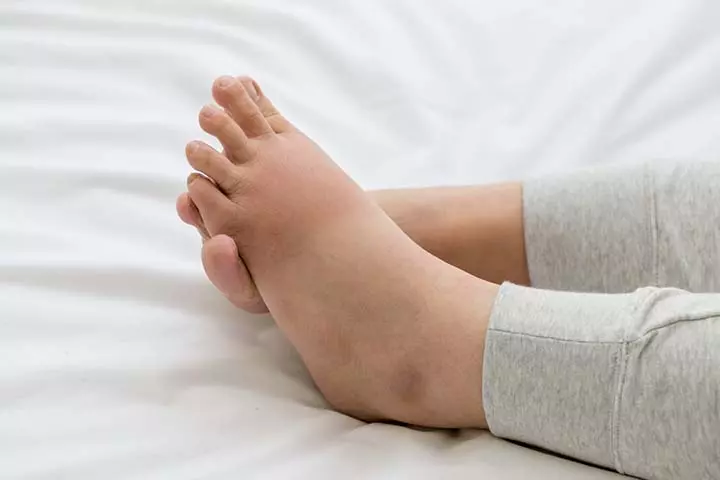
Your doctor may advise you against standing for a long time if you are having any complications.
Standing for a long duration, especially in late pregnancy, may cause back pain and leg cramps. It may also reduce the flow of blood to the fetus, therefore, affecting that baby’s growth, reducing the availability of oxygen and nutrients to the fetus (1).
Research studies show that standing for long hours affects the growth of the baby. One study has found that women standing for more than 25 hours per week could give birth to babies who weigh 148-198g less than the babies born to women who do not stand for that long. Babies born to mothers who stand for too long might also have a head circumference a centimeter shorter (2) (3), which may affect the baby’s neuro-development.
We’ll tell you about some more effects in the later sections.
How Long Can You Stand When Pregnant?

You may stand as long as you feel comfortable and until there is no pain, fatigue, or discomfort in your back or legs. If your job demands you to stand for a long time, then it is good to move your legs often and take a walk or keep one foot on a small step stool to feel better (1).
 Experts say
Experts sayHow Does Standing For Long Hours Affect You And Your Unborn Baby?
Long hours standing during pregnancy may sometimes aggravate pregnancy symptoms or affect you and your baby in the following ways.
- Edema: Edema or swelling of feet is common during pregnancy. Also, the extra water in the body tends to accumulate in the lower extremities when you stand for a long time and may worsen the condition. (4).
- Pain in the pubic area: Some women may have symphysis pubis dysfunction (SPD) that causes severe pelvic pain. Standing for prolonged hours, especially on one leg, may worsen the pubic pain (5) (6).
- Change in blood pressure: It may cause a drop in blood pressure (7) or a rise in it (8). If you have low blood pressure, you may feel giddy or have balance issues.
- Lower back pain: Standing for too long may cause low back pain during pregnancy. The pain may also radiate to your leg or foot (9). Standing for long periods can also cause sciatica.
- Risk of preterm birth: Spending most of your time standing may increase your risk of miscarriages or having preterm labor and premature birth (fetal medical complications) (10).
Most of these effects are for women who have the occupational requirement of continuous standing for long periods.
 Did you know?
Did you know?How To Overcome The Effects Of Standing When Pregnant?

Standing might not be a concern as long as you walk around comfortably. But, if your work or lifestyle requires you to stand for prolonged periods, you may have to take the following measures (18) (19) (20).
- Avoid wearing heels during pregnancy. Instead, wear footwear that has the right arch and heel support for a comfortable standing position.
According to gynecologist and laparoscopic surgeon Dr. Swati Chitnis, “Wearing comfortable shoes, loose bottoms of breathable material, taking frequent breaks from stationary standing, and taking a walk around helps avert discomfort associated with prolonged standing.”
- Maintain proper posture while standing and vary your posture often. Tuck your pelvis and keep your feet slightly apart while you stand to keep the weight off your lower back.
- Wear compression stockings as they promote blood circulation and prevent swollen feet and clot formation. According to the US Centers for Disease Control and Prevention (CDC), pregnant women are five times more likely to experience blood clots than women who are not pregnant (21). Hence, taking precautions such as wearing compression stockings can help maintain healthy blood circulation in the legs and reduce the risk of blood clots.
- As you get into your late second and third trimester, consider wearing a maternity belt. Wrapping it over and under your belly will provide support and relieve lower back pain.
- Take frequent short walks. It could help with blood circulation. Walking during pregnancy also eases constipation and supports delivery.
- Consume sufficient water and healthy juices to keep yourself hydrated throughout the day. Avoid caffeinated drinks as they can cause dehydration.
- Talk to your manager about your pregnancy issues and see if you can switch to a work that does not involve long standing hours. If that is not possible, ask for more breaks and use a footrest or low stool to prop one foot for support.
- Make ergonomic adjustments at work, such as using adjustable desks or footrests, to increase comfort and reduce strain while standing or sitting. Place one foot over a step stool if you need to stand for a long while.
- Manage your stress levels by doing some breathing exercises and meditation.
- Sleeping on the left side increases blood circulation helping the swelling.
 Caution
CautionAlso, you need to talk to your doctor about your occupational requirements and get clearance from them.
How To Manage At Workplace?

Seek help from your team when in need and communicate with them about your needs and goals. Request your organization to delegate your job to places with easy access to breakrooms and medical facilities. Let the others know that you are pregnant and need to take breaks. Nothing is embarrassing about it because you are doing one of the best jobs in this world – giving birth to a new life.
It is best to delegate more tedious tasks that require standing for long hours, handling heavy equipment or toxins, and overtime supervision to others the especially in high-risk environments.
Dr. Chitnis says, “It is recommended to avoid work with long standing hours or heavy physical labor after 32 weeks. This may be a good time to begin your maternity leave.”
Furthermore, seek help from your gynecologist asking them to write you a letter with reasons to lessen your workload and allow you more time for breaks, especially towards the later part of your pregnancy. Also, do not hesitate to sit and relax in between your work. Such permissions may even be helpful should you require medical leave or permission to work from home on days when you experience severe cramps and pain along your legs or abdomen (22) (23).
Frequently Asked Questions
1. Can standing too long cause a miscarriage?
According to the National Institute for Occupational Safety and Health, standing for long periods could increase your chance of miscarriage (11). However, there is only an increase in risk, and there is no direct link between standing for a long time and miscarriage (12)
2. Is standing for eight hours bad while pregnant?
Long hours of work may hamper the growth of a developing fetus. A study noted that working and standing more than 25 hours a week may have adverse effects on pregnancy outcomes (2). So, it is certainly not healthy to stand for too many hours.
3. Can standing for long periods of time cause early labor?
Standing for long periods may increase your risk of early labor. The chance is even higher if you are already at risk of preterm labor for other reasons, including age, previous history of preterm labor, smoking, alcohol consumption, multiple pregnancies, and infections (13).
4. How long should I walk during pregnancy?
Pregnant women are recommended to engage in moderate-intensity pregnancy exercises, such as walking, for at least 30 minutes each day (17).
In pregnancy, you should take optimum care to minimize the risk of pregnancy pains and other complications. Long hours standing during pregnancy can impact your health by inducing back pain, swelling of feet, or increasing the risk for preterm delivery. So, try to avoid it by taking breaks from continuous standing and wearing supportive gear such as maternity belts. Do not overwork yourself and continue to stand only till your body feels comfortable. Consult your ob/gyn to understand in case of extreme pain caused due to standing for long hours during pregnancy.
Infographic: How To Overcome The Effects Of Standing When Pregnant?
Whether your profession demands you to stand for a long time or you cannot avoid standing due to traveling, it may cause health issues and discomfort while pregnant. To help you with that, this infographic details simple steps you may follow to prevent the adverse effects of prolonged standing during pregnancy. Illustration: Momjunction Design Team
Illustration: Long Hours Standing During Pregnancy: Are There Any Risks?
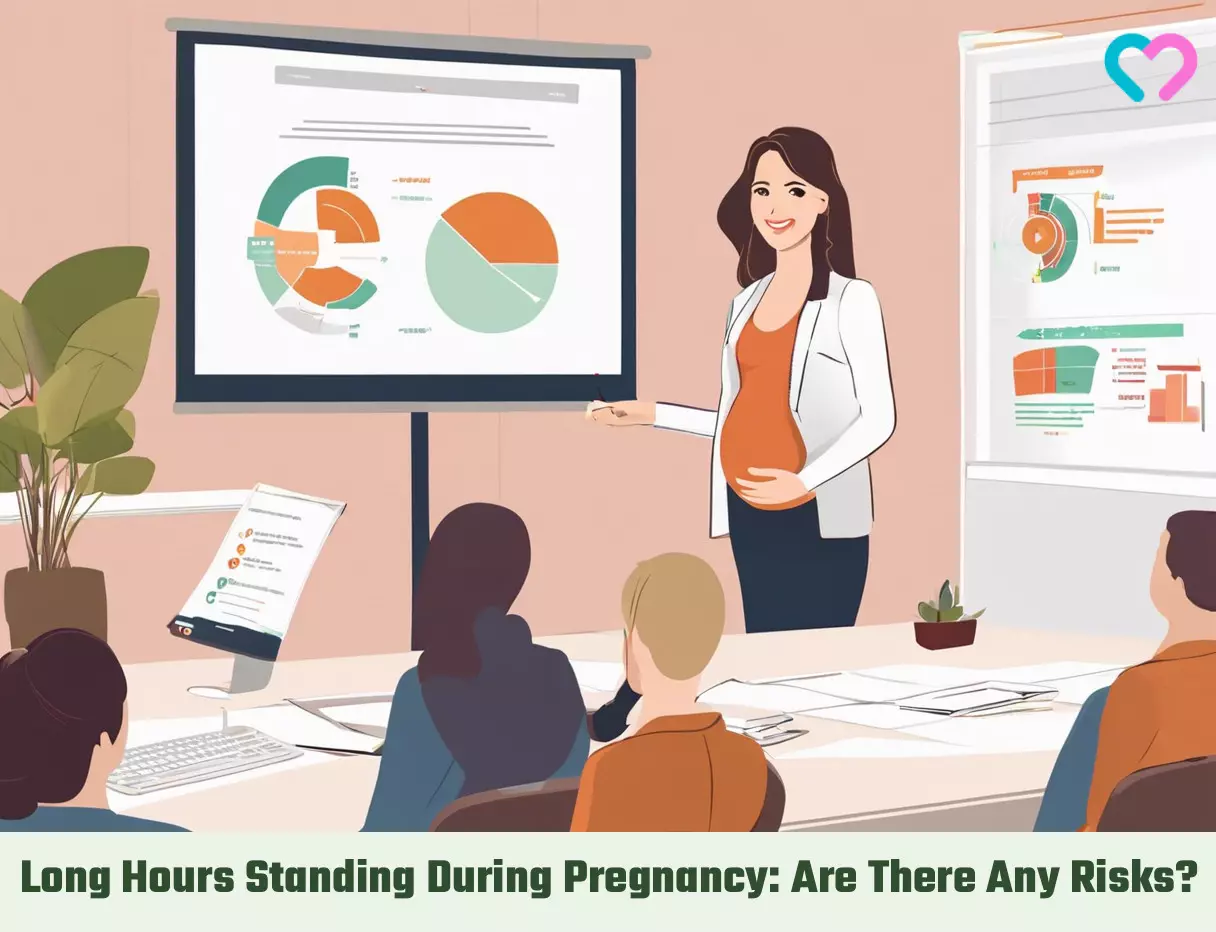
Image: Stable Diffusion/MomJunction Design Team
References
Community Experiences
Join the conversation and become a part of our nurturing community! Share your stories, experiences, and insights to connect with fellow parents.
Read full bio of Dr. Irene (Eirini) Orfanoudaki
- Dr. Swati Chitnis is a gynecologist and endoscopic surgeon with over 8 years of experience. She did her bachelor in medicine at BJ Medical College & Sassoon Hospital, Pune, India and MS at the prestigious King Edward Memorial Hospital, Mumbai. She worked in various hospitals in Mumbai and currently runs her private practice.
 Dr. Swati Chitnis is a gynecologist and endoscopic surgeon with over 8 years of experience. She did her bachelor in medicine at BJ Medical College & Sassoon Hospital, Pune, India and MS at the prestigious King Edward Memorial Hospital, Mumbai. She worked in various hospitals in Mumbai and currently runs her private practice.
Dr. Swati Chitnis is a gynecologist and endoscopic surgeon with over 8 years of experience. She did her bachelor in medicine at BJ Medical College & Sassoon Hospital, Pune, India and MS at the prestigious King Edward Memorial Hospital, Mumbai. She worked in various hospitals in Mumbai and currently runs her private practice.
Read full bio of Rebecca Malachi
Read full bio of Swati Patwal
Read full bio of Dr. Joyani Das







